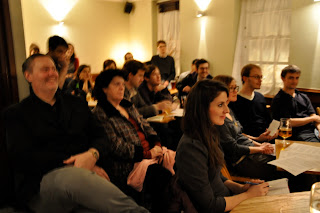Photos from the zombie event
Peter Jones giving his talk
Amy Cutler giving her talk
Q&A
Q&A with Jennifer Cooke, Amy Cutler and Peter Jones
Rob asking questions
Peter Jones answering questions
Amy Cutler and Peter Jones answering questions
Venue: The Centre for Creative Collaboration, 16 Acton Street, London
Time: Friday 8th April, 7pm
Please come as plague victim, zombie, anointed one…etc. This is a nonfunded, free event, so you may want to bring your own wine or a donation towards it.
Feeling distempered? Not sure if it’s the plague or a zombie virus? Come along to this then…
Zombies are defined not simply by being dead, but by being the moving dead – as in recent TV series ‘The Walking Dead’ in which they are simply nicknamed ‘walkers’. This event connects the radical aspects of zombie mobility with its literary heritage in Daniel Defoe’s Journal of the Plague Year (1722).
Often when geographers talk about zombie films they use the word ‘meatspace’. The concept of the zombie mob – like the flash mob, or the slum – reminds us of the corporeality of cities, and that they are filled by bodies (and that those bodies also create the city).
Amy Cutler will explore this using Defoe’s text, a plan of London, and clips from contemporary zombie films.
Peter Jones will talk about the plague-ridden Milan of Alessandro Manzoni’s novel The Betrothed (1827) and its connections with zombie outbreak.
Josh Morrall will perform readings from the texts, accompanying clips from films, and James DC will be present to answer questions about and take suggestions for his coming radio show about zombies on Resonance FM.
Often when geographers talk about zombie films they use the word ‘meatspace’. The concept of the zombie mob – like the flash mob, or the slum – reminds us of the corporeality of cities, and that they are filled by bodies (and that those bodies also create the city).
Amy Cutler will explore this using Defoe’s text, a plan of London, and clips from contemporary zombie films.
Peter Jones will talk about the plague-ridden Milan of Alessandro Manzoni’s novel The Betrothed (1827) and its connections with zombie outbreak.
Josh Morrall will perform readings from the texts, accompanying clips from films, and James DC will be present to answer questions about and take suggestions for his coming radio show about zombies on Resonance FM.
Bio's:
Amy Cutler is a researcher at Royal Holloway, University of London, completing an interdisciplinary PhD between the English department and the Cultural Geography department. Although her research is on contemporary landscape poetry, she teaches classes in film interpretation on the ‘Geographies of Mobility’ course, and has also recently launched a monthly film society, PASSENGERFILMS, ‘the carcrash of cinema and geography’ (www.passengerfilms.wordpre
Peter Jones is a PhD researcher in English at Queen Mary, University of London, studying ‘abject streets’ and the urban gothic in literary representations of the Victorian street market.













